Air Pie's Cultural Implications in International Business
VerifiedAdded on 2021/04/17
|9
|1749
|26
Report
AI Summary
This report examines the international business strategies of Air Pie, a UK-based fast-food restaurant, as it expands into Japan and the USA. It evaluates the cultural implications of entering these markets, focusing on Hofstede's cultural dimensions. The report highlights the need for Air Pie to adapt its strategies to align with the cultural nuances of each country, recommending a team-oriented approach in Japan and an individualized approach in the USA. It also emphasizes the importance of self-awareness and sensitivity to diversity for successful international business operations. The report suggests that Air Pie should adopt innovative strategies to meet the customized food preferences of customers in the USA. Ultimately, the report concludes with recommendations for Air Pie to navigate the challenges of international business and achieve sustainable success in both Japan and the USA.
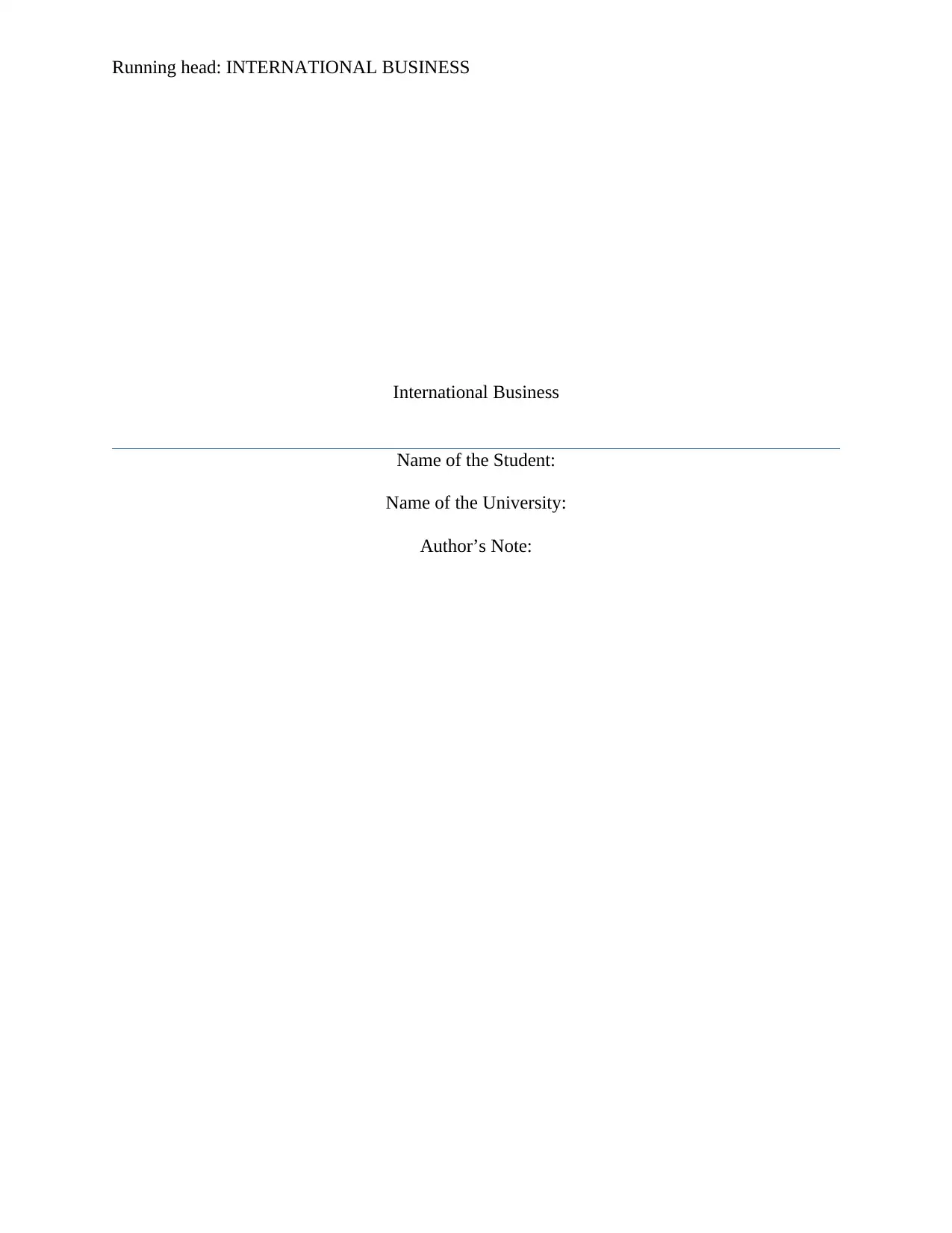
Running head: INTERNATIONAL BUSINESS
International Business
Name of the Student:
Name of the University:
Author’s Note:
International Business
Name of the Student:
Name of the University:
Author’s Note:
Paraphrase This Document
Need a fresh take? Get an instant paraphrase of this document with our AI Paraphraser
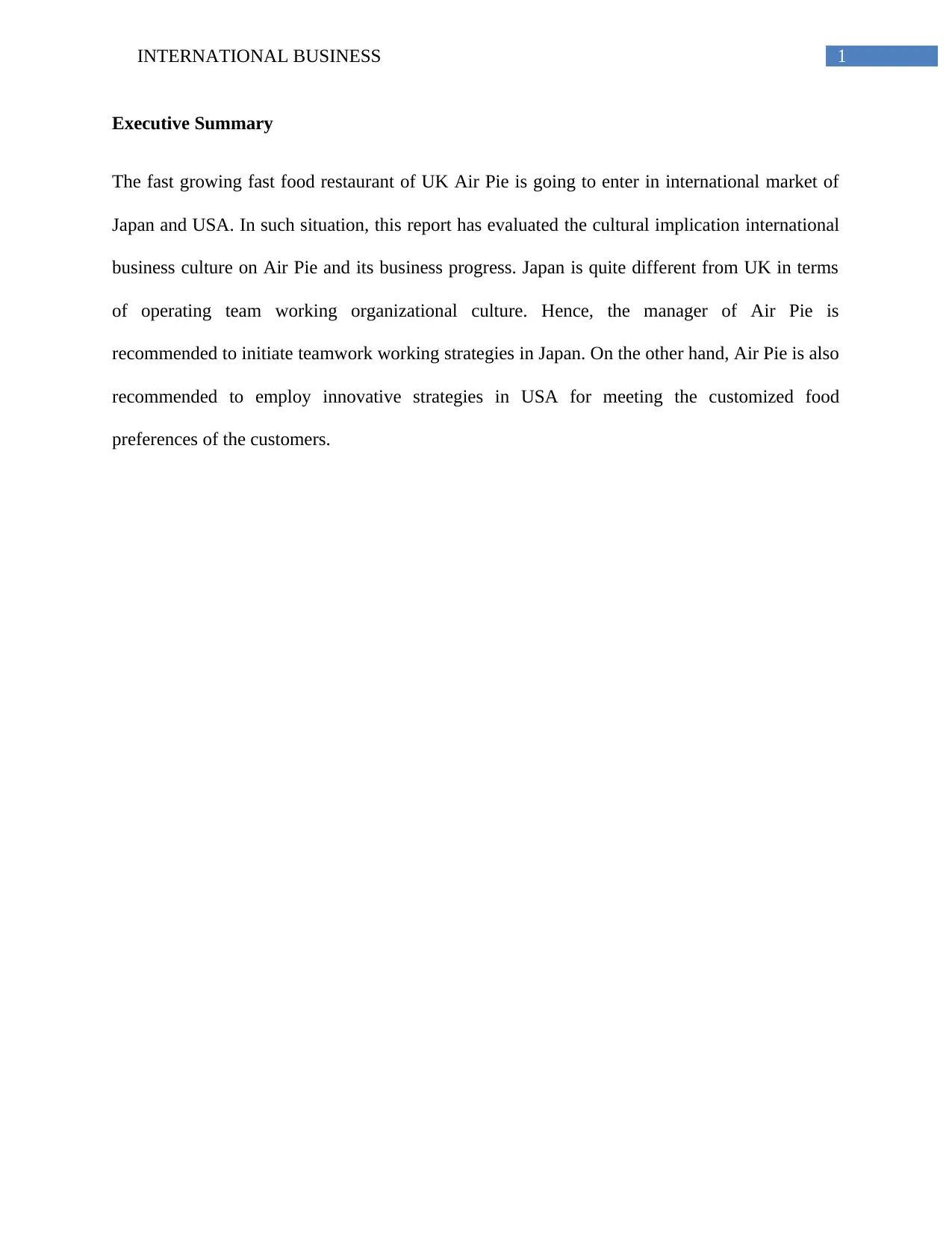
1INTERNATIONAL BUSINESS
Executive Summary
The fast growing fast food restaurant of UK Air Pie is going to enter in international market of
Japan and USA. In such situation, this report has evaluated the cultural implication international
business culture on Air Pie and its business progress. Japan is quite different from UK in terms
of operating team working organizational culture. Hence, the manager of Air Pie is
recommended to initiate teamwork working strategies in Japan. On the other hand, Air Pie is also
recommended to employ innovative strategies in USA for meeting the customized food
preferences of the customers.
Executive Summary
The fast growing fast food restaurant of UK Air Pie is going to enter in international market of
Japan and USA. In such situation, this report has evaluated the cultural implication international
business culture on Air Pie and its business progress. Japan is quite different from UK in terms
of operating team working organizational culture. Hence, the manager of Air Pie is
recommended to initiate teamwork working strategies in Japan. On the other hand, Air Pie is also
recommended to employ innovative strategies in USA for meeting the customized food
preferences of the customers.
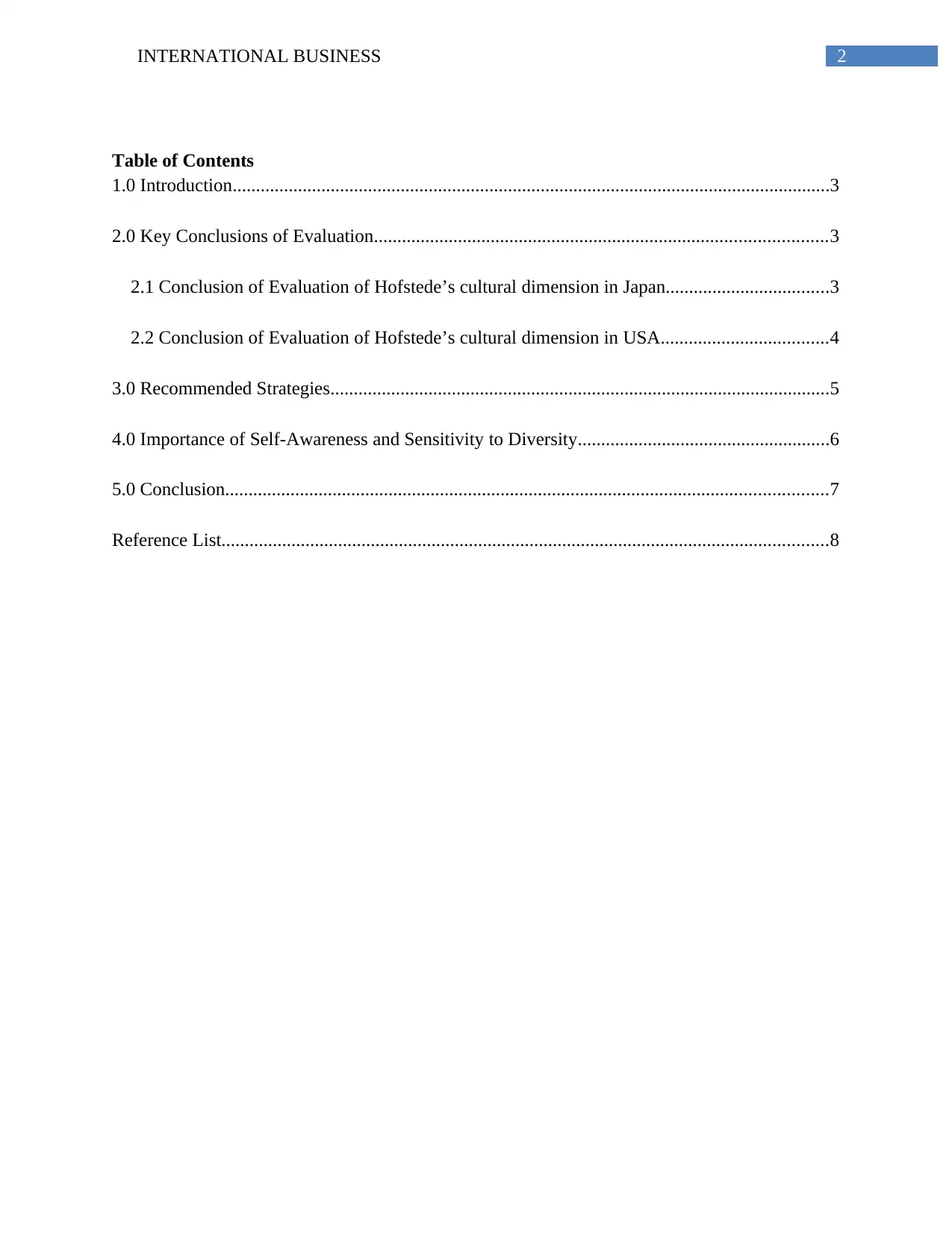
2INTERNATIONAL BUSINESS
Table of Contents
1.0 Introduction................................................................................................................................3
2.0 Key Conclusions of Evaluation.................................................................................................3
2.1 Conclusion of Evaluation of Hofstede’s cultural dimension in Japan...................................3
2.2 Conclusion of Evaluation of Hofstede’s cultural dimension in USA....................................4
3.0 Recommended Strategies...........................................................................................................5
4.0 Importance of Self-Awareness and Sensitivity to Diversity......................................................6
5.0 Conclusion.................................................................................................................................7
Reference List..................................................................................................................................8
Table of Contents
1.0 Introduction................................................................................................................................3
2.0 Key Conclusions of Evaluation.................................................................................................3
2.1 Conclusion of Evaluation of Hofstede’s cultural dimension in Japan...................................3
2.2 Conclusion of Evaluation of Hofstede’s cultural dimension in USA....................................4
3.0 Recommended Strategies...........................................................................................................5
4.0 Importance of Self-Awareness and Sensitivity to Diversity......................................................6
5.0 Conclusion.................................................................................................................................7
Reference List..................................................................................................................................8
⊘ This is a preview!⊘
Do you want full access?
Subscribe today to unlock all pages.

Trusted by 1+ million students worldwide
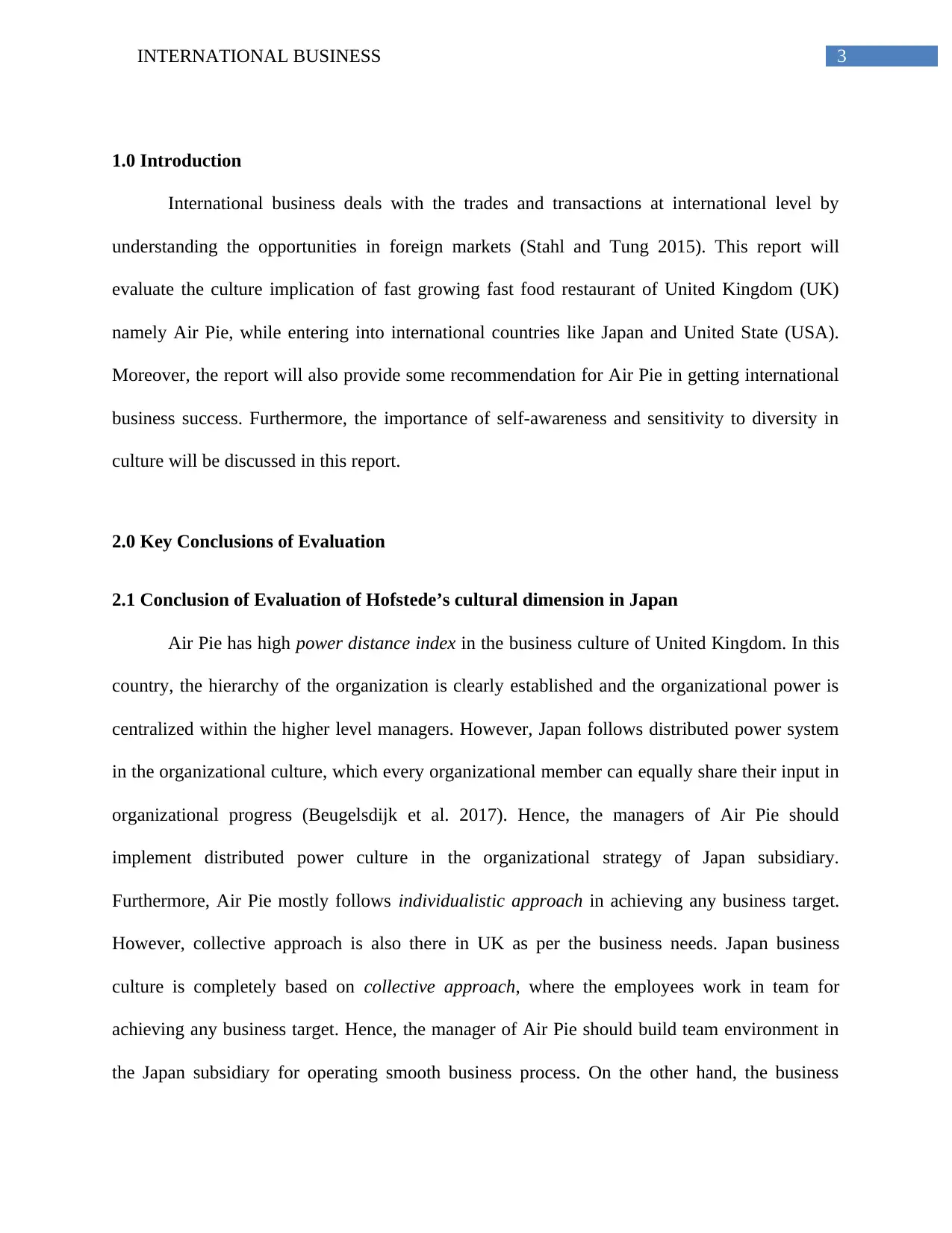
3INTERNATIONAL BUSINESS
1.0 Introduction
International business deals with the trades and transactions at international level by
understanding the opportunities in foreign markets (Stahl and Tung 2015). This report will
evaluate the culture implication of fast growing fast food restaurant of United Kingdom (UK)
namely Air Pie, while entering into international countries like Japan and United State (USA).
Moreover, the report will also provide some recommendation for Air Pie in getting international
business success. Furthermore, the importance of self-awareness and sensitivity to diversity in
culture will be discussed in this report.
2.0 Key Conclusions of Evaluation
2.1 Conclusion of Evaluation of Hofstede’s cultural dimension in Japan
Air Pie has high power distance index in the business culture of United Kingdom. In this
country, the hierarchy of the organization is clearly established and the organizational power is
centralized within the higher level managers. However, Japan follows distributed power system
in the organizational culture, which every organizational member can equally share their input in
organizational progress (Beugelsdijk et al. 2017). Hence, the managers of Air Pie should
implement distributed power culture in the organizational strategy of Japan subsidiary.
Furthermore, Air Pie mostly follows individualistic approach in achieving any business target.
However, collective approach is also there in UK as per the business needs. Japan business
culture is completely based on collective approach, where the employees work in team for
achieving any business target. Hence, the manager of Air Pie should build team environment in
the Japan subsidiary for operating smooth business process. On the other hand, the business
1.0 Introduction
International business deals with the trades and transactions at international level by
understanding the opportunities in foreign markets (Stahl and Tung 2015). This report will
evaluate the culture implication of fast growing fast food restaurant of United Kingdom (UK)
namely Air Pie, while entering into international countries like Japan and United State (USA).
Moreover, the report will also provide some recommendation for Air Pie in getting international
business success. Furthermore, the importance of self-awareness and sensitivity to diversity in
culture will be discussed in this report.
2.0 Key Conclusions of Evaluation
2.1 Conclusion of Evaluation of Hofstede’s cultural dimension in Japan
Air Pie has high power distance index in the business culture of United Kingdom. In this
country, the hierarchy of the organization is clearly established and the organizational power is
centralized within the higher level managers. However, Japan follows distributed power system
in the organizational culture, which every organizational member can equally share their input in
organizational progress (Beugelsdijk et al. 2017). Hence, the managers of Air Pie should
implement distributed power culture in the organizational strategy of Japan subsidiary.
Furthermore, Air Pie mostly follows individualistic approach in achieving any business target.
However, collective approach is also there in UK as per the business needs. Japan business
culture is completely based on collective approach, where the employees work in team for
achieving any business target. Hence, the manager of Air Pie should build team environment in
the Japan subsidiary for operating smooth business process. On the other hand, the business
Paraphrase This Document
Need a fresh take? Get an instant paraphrase of this document with our AI Paraphraser
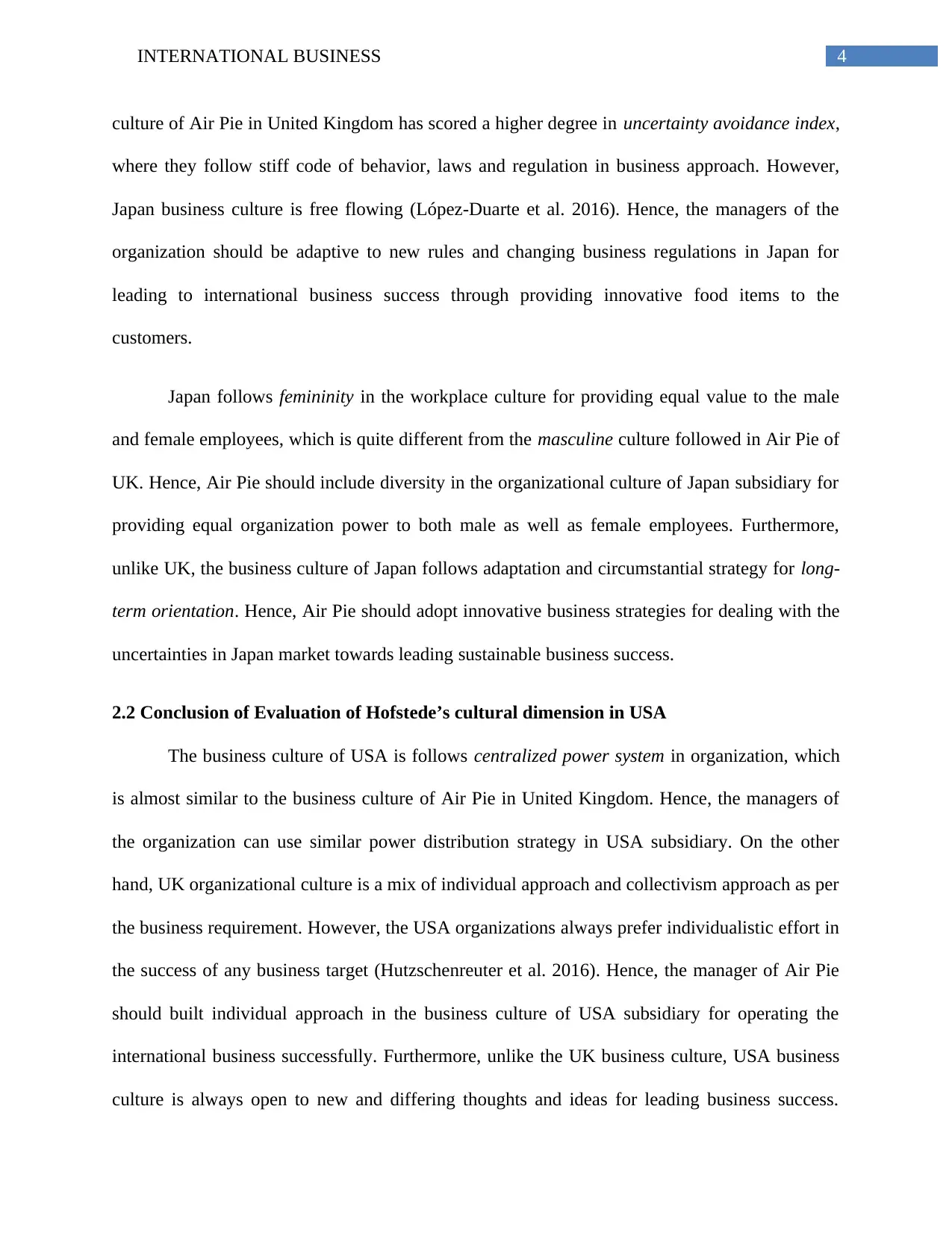
4INTERNATIONAL BUSINESS
culture of Air Pie in United Kingdom has scored a higher degree in uncertainty avoidance index,
where they follow stiff code of behavior, laws and regulation in business approach. However,
Japan business culture is free flowing (López‐Duarte et al. 2016). Hence, the managers of the
organization should be adaptive to new rules and changing business regulations in Japan for
leading to international business success through providing innovative food items to the
customers.
Japan follows femininity in the workplace culture for providing equal value to the male
and female employees, which is quite different from the masculine culture followed in Air Pie of
UK. Hence, Air Pie should include diversity in the organizational culture of Japan subsidiary for
providing equal organization power to both male as well as female employees. Furthermore,
unlike UK, the business culture of Japan follows adaptation and circumstantial strategy for long-
term orientation. Hence, Air Pie should adopt innovative business strategies for dealing with the
uncertainties in Japan market towards leading sustainable business success.
2.2 Conclusion of Evaluation of Hofstede’s cultural dimension in USA
The business culture of USA is follows centralized power system in organization, which
is almost similar to the business culture of Air Pie in United Kingdom. Hence, the managers of
the organization can use similar power distribution strategy in USA subsidiary. On the other
hand, UK organizational culture is a mix of individual approach and collectivism approach as per
the business requirement. However, the USA organizations always prefer individualistic effort in
the success of any business target (Hutzschenreuter et al. 2016). Hence, the manager of Air Pie
should built individual approach in the business culture of USA subsidiary for operating the
international business successfully. Furthermore, unlike the UK business culture, USA business
culture is always open to new and differing thoughts and ideas for leading business success.
culture of Air Pie in United Kingdom has scored a higher degree in uncertainty avoidance index,
where they follow stiff code of behavior, laws and regulation in business approach. However,
Japan business culture is free flowing (López‐Duarte et al. 2016). Hence, the managers of the
organization should be adaptive to new rules and changing business regulations in Japan for
leading to international business success through providing innovative food items to the
customers.
Japan follows femininity in the workplace culture for providing equal value to the male
and female employees, which is quite different from the masculine culture followed in Air Pie of
UK. Hence, Air Pie should include diversity in the organizational culture of Japan subsidiary for
providing equal organization power to both male as well as female employees. Furthermore,
unlike UK, the business culture of Japan follows adaptation and circumstantial strategy for long-
term orientation. Hence, Air Pie should adopt innovative business strategies for dealing with the
uncertainties in Japan market towards leading sustainable business success.
2.2 Conclusion of Evaluation of Hofstede’s cultural dimension in USA
The business culture of USA is follows centralized power system in organization, which
is almost similar to the business culture of Air Pie in United Kingdom. Hence, the managers of
the organization can use similar power distribution strategy in USA subsidiary. On the other
hand, UK organizational culture is a mix of individual approach and collectivism approach as per
the business requirement. However, the USA organizations always prefer individualistic effort in
the success of any business target (Hutzschenreuter et al. 2016). Hence, the manager of Air Pie
should built individual approach in the business culture of USA subsidiary for operating the
international business successfully. Furthermore, unlike the UK business culture, USA business
culture is always open to new and differing thoughts and ideas for leading business success.
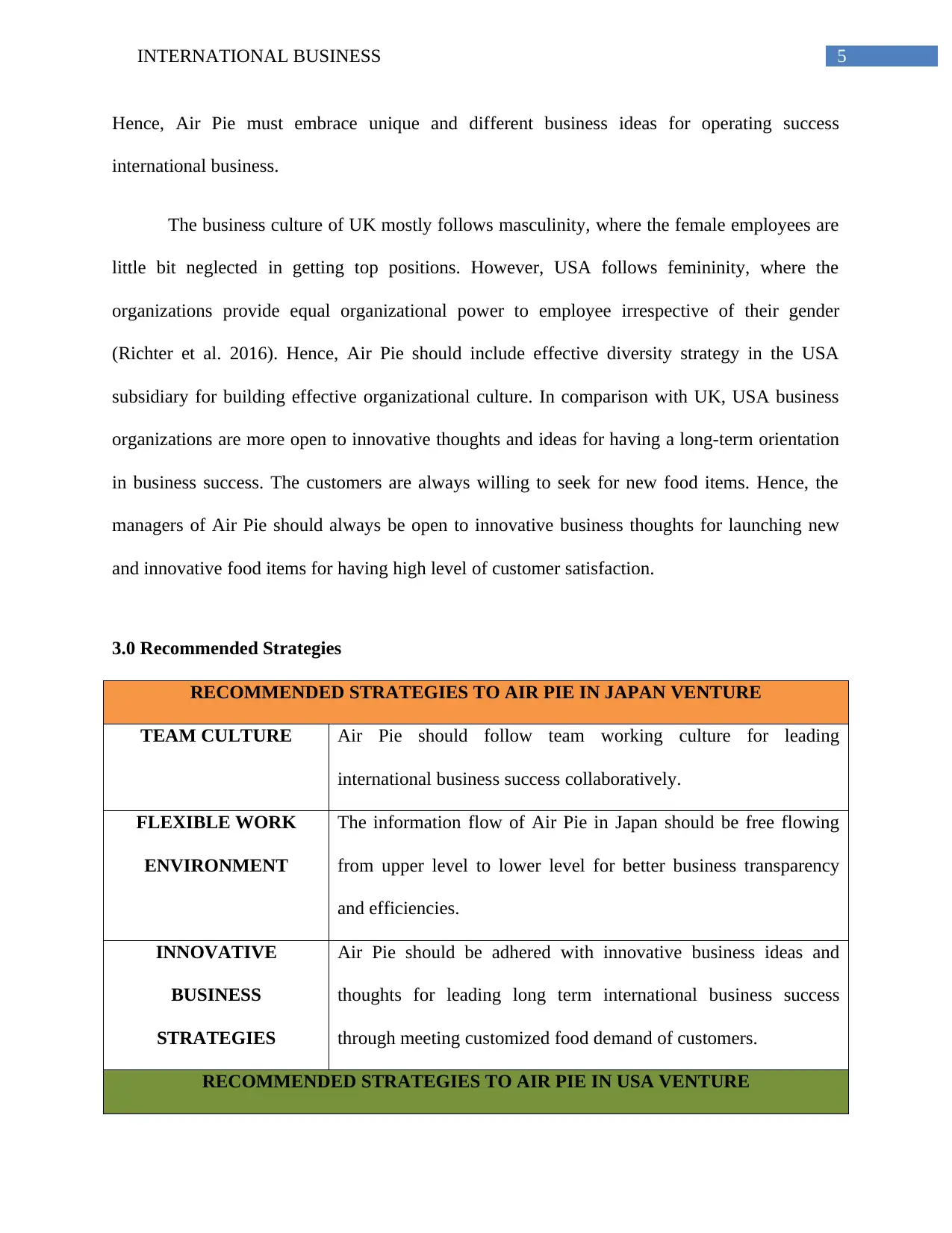
5INTERNATIONAL BUSINESS
Hence, Air Pie must embrace unique and different business ideas for operating success
international business.
The business culture of UK mostly follows masculinity, where the female employees are
little bit neglected in getting top positions. However, USA follows femininity, where the
organizations provide equal organizational power to employee irrespective of their gender
(Richter et al. 2016). Hence, Air Pie should include effective diversity strategy in the USA
subsidiary for building effective organizational culture. In comparison with UK, USA business
organizations are more open to innovative thoughts and ideas for having a long-term orientation
in business success. The customers are always willing to seek for new food items. Hence, the
managers of Air Pie should always be open to innovative business thoughts for launching new
and innovative food items for having high level of customer satisfaction.
3.0 Recommended Strategies
RECOMMENDED STRATEGIES TO AIR PIE IN JAPAN VENTURE
TEAM CULTURE Air Pie should follow team working culture for leading
international business success collaboratively.
FLEXIBLE WORK
ENVIRONMENT
The information flow of Air Pie in Japan should be free flowing
from upper level to lower level for better business transparency
and efficiencies.
INNOVATIVE
BUSINESS
STRATEGIES
Air Pie should be adhered with innovative business ideas and
thoughts for leading long term international business success
through meeting customized food demand of customers.
RECOMMENDED STRATEGIES TO AIR PIE IN USA VENTURE
Hence, Air Pie must embrace unique and different business ideas for operating success
international business.
The business culture of UK mostly follows masculinity, where the female employees are
little bit neglected in getting top positions. However, USA follows femininity, where the
organizations provide equal organizational power to employee irrespective of their gender
(Richter et al. 2016). Hence, Air Pie should include effective diversity strategy in the USA
subsidiary for building effective organizational culture. In comparison with UK, USA business
organizations are more open to innovative thoughts and ideas for having a long-term orientation
in business success. The customers are always willing to seek for new food items. Hence, the
managers of Air Pie should always be open to innovative business thoughts for launching new
and innovative food items for having high level of customer satisfaction.
3.0 Recommended Strategies
RECOMMENDED STRATEGIES TO AIR PIE IN JAPAN VENTURE
TEAM CULTURE Air Pie should follow team working culture for leading
international business success collaboratively.
FLEXIBLE WORK
ENVIRONMENT
The information flow of Air Pie in Japan should be free flowing
from upper level to lower level for better business transparency
and efficiencies.
INNOVATIVE
BUSINESS
STRATEGIES
Air Pie should be adhered with innovative business ideas and
thoughts for leading long term international business success
through meeting customized food demand of customers.
RECOMMENDED STRATEGIES TO AIR PIE IN USA VENTURE
⊘ This is a preview!⊘
Do you want full access?
Subscribe today to unlock all pages.

Trusted by 1+ million students worldwide
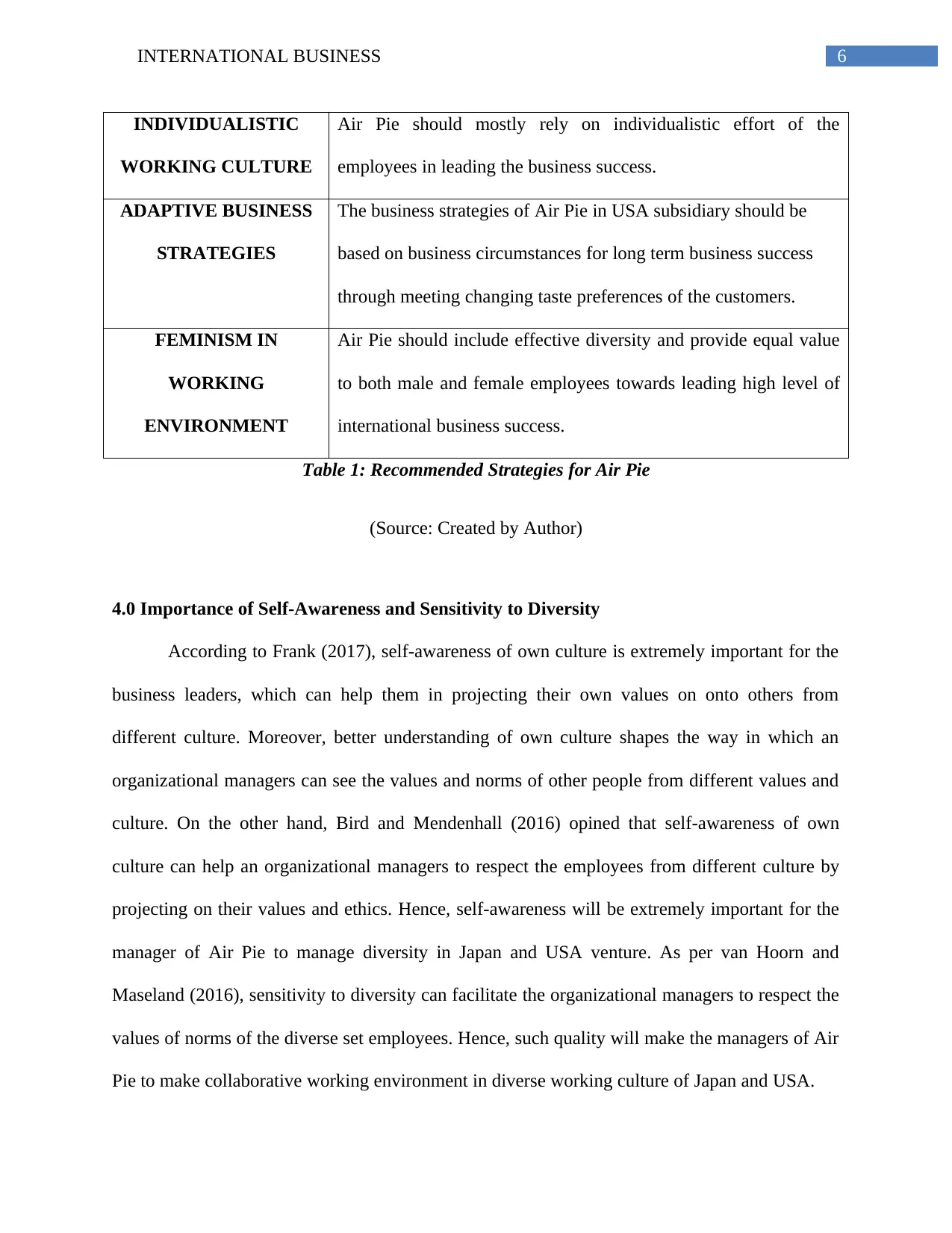
6INTERNATIONAL BUSINESS
INDIVIDUALISTIC
WORKING CULTURE
Air Pie should mostly rely on individualistic effort of the
employees in leading the business success.
ADAPTIVE BUSINESS
STRATEGIES
The business strategies of Air Pie in USA subsidiary should be
based on business circumstances for long term business success
through meeting changing taste preferences of the customers.
FEMINISM IN
WORKING
ENVIRONMENT
Air Pie should include effective diversity and provide equal value
to both male and female employees towards leading high level of
international business success.
Table 1: Recommended Strategies for Air Pie
(Source: Created by Author)
4.0 Importance of Self-Awareness and Sensitivity to Diversity
According to Frank (2017), self-awareness of own culture is extremely important for the
business leaders, which can help them in projecting their own values on onto others from
different culture. Moreover, better understanding of own culture shapes the way in which an
organizational managers can see the values and norms of other people from different values and
culture. On the other hand, Bird and Mendenhall (2016) opined that self-awareness of own
culture can help an organizational managers to respect the employees from different culture by
projecting on their values and ethics. Hence, self-awareness will be extremely important for the
manager of Air Pie to manage diversity in Japan and USA venture. As per van Hoorn and
Maseland (2016), sensitivity to diversity can facilitate the organizational managers to respect the
values of norms of the diverse set employees. Hence, such quality will make the managers of Air
Pie to make collaborative working environment in diverse working culture of Japan and USA.
INDIVIDUALISTIC
WORKING CULTURE
Air Pie should mostly rely on individualistic effort of the
employees in leading the business success.
ADAPTIVE BUSINESS
STRATEGIES
The business strategies of Air Pie in USA subsidiary should be
based on business circumstances for long term business success
through meeting changing taste preferences of the customers.
FEMINISM IN
WORKING
ENVIRONMENT
Air Pie should include effective diversity and provide equal value
to both male and female employees towards leading high level of
international business success.
Table 1: Recommended Strategies for Air Pie
(Source: Created by Author)
4.0 Importance of Self-Awareness and Sensitivity to Diversity
According to Frank (2017), self-awareness of own culture is extremely important for the
business leaders, which can help them in projecting their own values on onto others from
different culture. Moreover, better understanding of own culture shapes the way in which an
organizational managers can see the values and norms of other people from different values and
culture. On the other hand, Bird and Mendenhall (2016) opined that self-awareness of own
culture can help an organizational managers to respect the employees from different culture by
projecting on their values and ethics. Hence, self-awareness will be extremely important for the
manager of Air Pie to manage diversity in Japan and USA venture. As per van Hoorn and
Maseland (2016), sensitivity to diversity can facilitate the organizational managers to respect the
values of norms of the diverse set employees. Hence, such quality will make the managers of Air
Pie to make collaborative working environment in diverse working culture of Japan and USA.
Paraphrase This Document
Need a fresh take? Get an instant paraphrase of this document with our AI Paraphraser
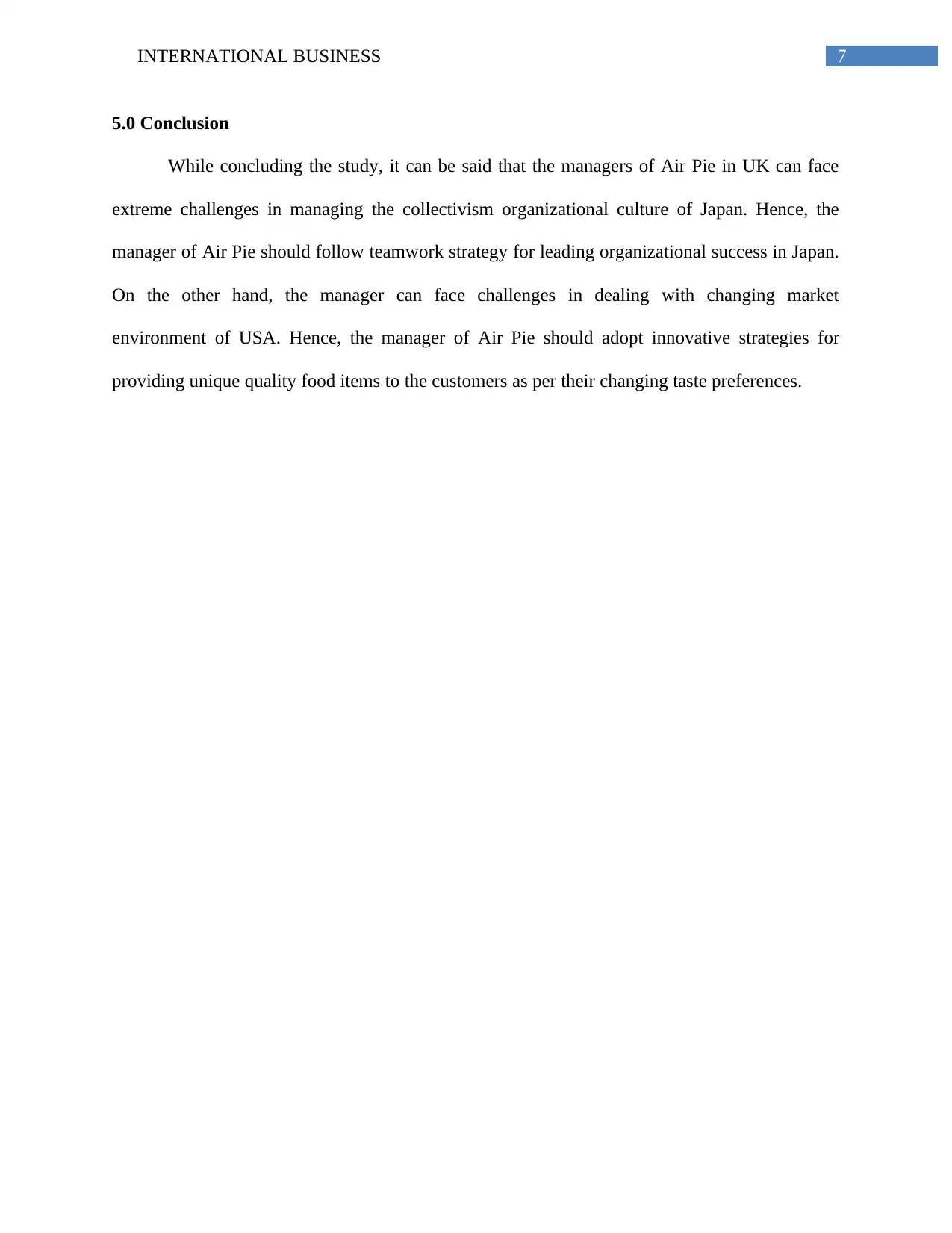
7INTERNATIONAL BUSINESS
5.0 Conclusion
While concluding the study, it can be said that the managers of Air Pie in UK can face
extreme challenges in managing the collectivism organizational culture of Japan. Hence, the
manager of Air Pie should follow teamwork strategy for leading organizational success in Japan.
On the other hand, the manager can face challenges in dealing with changing market
environment of USA. Hence, the manager of Air Pie should adopt innovative strategies for
providing unique quality food items to the customers as per their changing taste preferences.
5.0 Conclusion
While concluding the study, it can be said that the managers of Air Pie in UK can face
extreme challenges in managing the collectivism organizational culture of Japan. Hence, the
manager of Air Pie should follow teamwork strategy for leading organizational success in Japan.
On the other hand, the manager can face challenges in dealing with changing market
environment of USA. Hence, the manager of Air Pie should adopt innovative strategies for
providing unique quality food items to the customers as per their changing taste preferences.
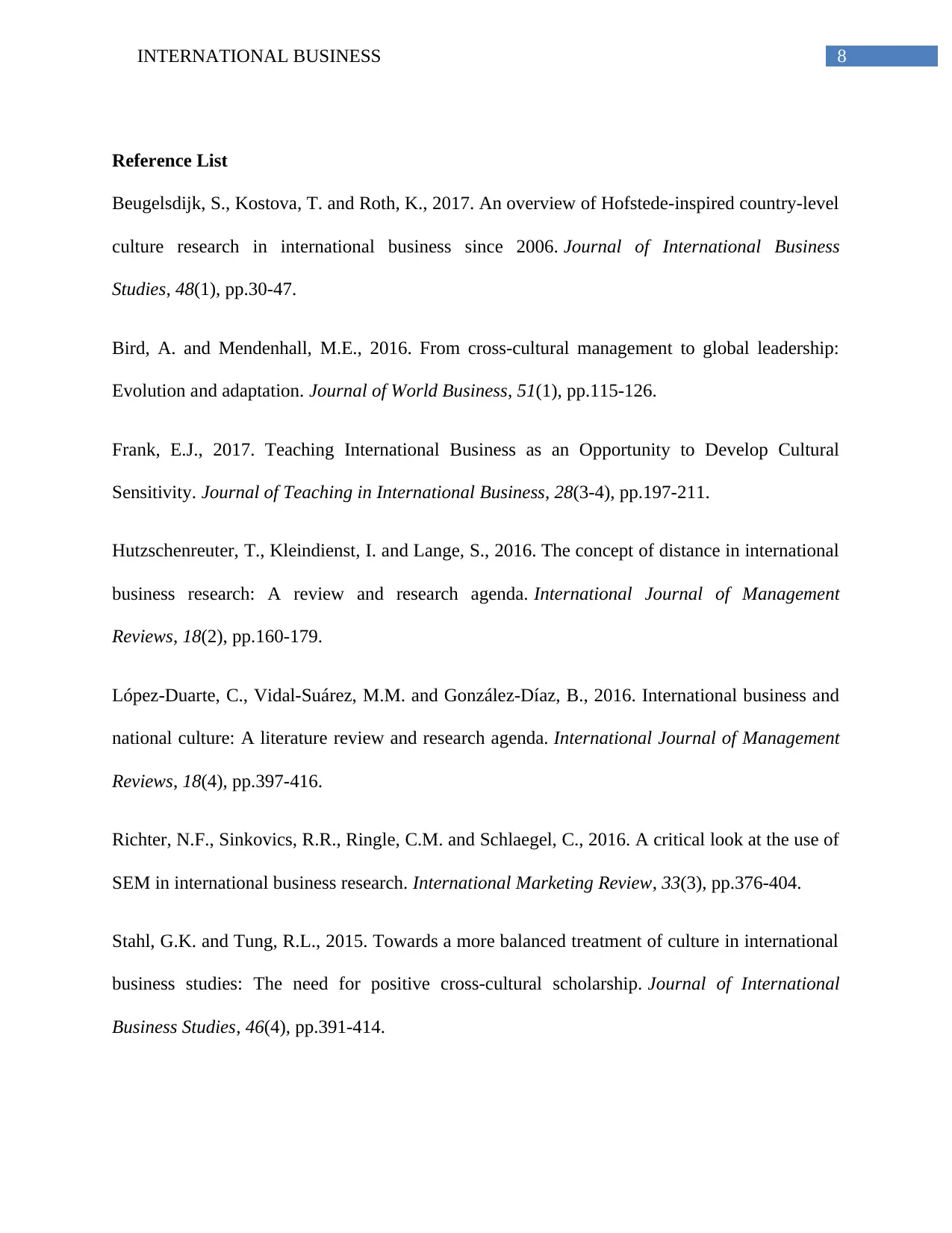
8INTERNATIONAL BUSINESS
Reference List
Beugelsdijk, S., Kostova, T. and Roth, K., 2017. An overview of Hofstede-inspired country-level
culture research in international business since 2006. Journal of International Business
Studies, 48(1), pp.30-47.
Bird, A. and Mendenhall, M.E., 2016. From cross-cultural management to global leadership:
Evolution and adaptation. Journal of World Business, 51(1), pp.115-126.
Frank, E.J., 2017. Teaching International Business as an Opportunity to Develop Cultural
Sensitivity. Journal of Teaching in International Business, 28(3-4), pp.197-211.
Hutzschenreuter, T., Kleindienst, I. and Lange, S., 2016. The concept of distance in international
business research: A review and research agenda. International Journal of Management
Reviews, 18(2), pp.160-179.
López‐Duarte, C., Vidal‐Suárez, M.M. and González‐Díaz, B., 2016. International business and
national culture: A literature review and research agenda. International Journal of Management
Reviews, 18(4), pp.397-416.
Richter, N.F., Sinkovics, R.R., Ringle, C.M. and Schlaegel, C., 2016. A critical look at the use of
SEM in international business research. International Marketing Review, 33(3), pp.376-404.
Stahl, G.K. and Tung, R.L., 2015. Towards a more balanced treatment of culture in international
business studies: The need for positive cross-cultural scholarship. Journal of International
Business Studies, 46(4), pp.391-414.
Reference List
Beugelsdijk, S., Kostova, T. and Roth, K., 2017. An overview of Hofstede-inspired country-level
culture research in international business since 2006. Journal of International Business
Studies, 48(1), pp.30-47.
Bird, A. and Mendenhall, M.E., 2016. From cross-cultural management to global leadership:
Evolution and adaptation. Journal of World Business, 51(1), pp.115-126.
Frank, E.J., 2017. Teaching International Business as an Opportunity to Develop Cultural
Sensitivity. Journal of Teaching in International Business, 28(3-4), pp.197-211.
Hutzschenreuter, T., Kleindienst, I. and Lange, S., 2016. The concept of distance in international
business research: A review and research agenda. International Journal of Management
Reviews, 18(2), pp.160-179.
López‐Duarte, C., Vidal‐Suárez, M.M. and González‐Díaz, B., 2016. International business and
national culture: A literature review and research agenda. International Journal of Management
Reviews, 18(4), pp.397-416.
Richter, N.F., Sinkovics, R.R., Ringle, C.M. and Schlaegel, C., 2016. A critical look at the use of
SEM in international business research. International Marketing Review, 33(3), pp.376-404.
Stahl, G.K. and Tung, R.L., 2015. Towards a more balanced treatment of culture in international
business studies: The need for positive cross-cultural scholarship. Journal of International
Business Studies, 46(4), pp.391-414.
⊘ This is a preview!⊘
Do you want full access?
Subscribe today to unlock all pages.

Trusted by 1+ million students worldwide
1 out of 9
Related Documents
Your All-in-One AI-Powered Toolkit for Academic Success.
+13062052269
info@desklib.com
Available 24*7 on WhatsApp / Email
![[object Object]](/_next/static/media/star-bottom.7253800d.svg)
Unlock your academic potential
Copyright © 2020–2026 A2Z Services. All Rights Reserved. Developed and managed by ZUCOL.





